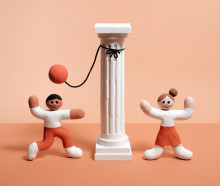We all want to support our kids – and our grandkids – that’s why we faithfully attend T-ball and soccer games, swim meets and tennis tournaments, and just about any sports activity our kids do.
That’s why I was drawn into the article, “How to Play Our Way to a Better Democracy.” It will make you think. Here is how it begins:
Before he died, Senator John McCain wrote a loving farewell statement to his fellow citizens of “the world’s greatest republic, a nation of ideals, not blood and soil.” Senator McCain also described our democracy as “325 million opinionated, vociferous individuals.” How can that many individuals bind themselves together to create a great nation? What special skills do we need to develop to compensate for our lack of shared ancestry?
When Alexis de Tocqueville toured America in 1831, he concluded that one secret of our success was our ability to solve problems collectively and cooperatively. He praised our mastery of the “art of association,” which was crucial, he believed, for a self-governing people.
In recent years, however, we have become less artful, particularly about crossing party lines. It’s not just Congress that has lost the ability to cooperate. As partisan hostility has increased, Americans report feeling fear and loathing toward people on the other side and have become increasingly less willing to date or marry someone of a different party. Some restaurants won’t serve customers who work for — or even just support — the other team or its policies. Support for democracy itself is in decline.
What can we do to reverse these trends? Is there some way to teach today’s children the art of association, even when today’s adults are poor models? There is. It’s free, it’s fun and it confers so many benefits that the American Academy of Pediatrics recently urged Americans to give far more of it to their children. It’s called play — and it matters not only for the health of our children but also for the health of our democracy.
Young mammals play, and in doing so they expend energy, get injured and expose themselves to predators. Why don’t they just stay safe? Because mammals enter the world with unfinished nervous systems, and they require play — lots of it — to finish the job. The young human brain “expects” the child to engage in thousands of hours of play, including thousands of falls, scrapes, conflicts, insults, alliances, betrayals, status competitions, and even (within limits) acts of exclusion, in order to develop its full capacities.
But not all play is created equal. Peter Gray, a developmental psychologist at Boston College, studies the effects of “free play,” which he defines as “activity that is freely chosen and directed by the participants and undertaken for its own sake, not consciously pursued to achieve ends that are distinct from the activity itself.” Guitar lessons and soccer practice are not free play — they are supervised and directed by an adult. But when kids jam with friends or take part in a pickup soccer game, that’s free play.
The absence of adults forces children to practice their social skills. For a pickup soccer game, the children themselves must obtain voluntary participation from everyone, enforce the rules and resolve disputes with no help from a referee, and then vary the rules or norms of play when special situations arise, such as the need to include a much younger sibling in the game. The absence of an adult also leaves room for children to take small risks, rather than assuming that adults will always be there, like guard rails, telling them where the limits of safety lie. Outdoor free play, in mixed-age groups, is the most effective way for children to learn these essential life skills.


